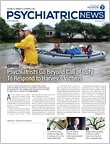Wellness starts with the mind. A balanced mind permeates all aspects of one’s everyday life. These simple truths have reverberated in my mind since my youth.
I grew up in Beaumont, Texas, where I was encouraged from childhood to develop a strong passion for education. My parents, who often mentioned their gratitude for physicians, fostered a desire in me to pursue every opportunity in life with abandon. As a young man, I was athletically inclined and participated in basketball. Sports taught me respect for my teammates and elders, instilled in me the value of hard work, and offered me gratification through introspection and growth.
During those years, I was fortunate to meet an elderly member of the community, Edwin Gale, who took an interest in my future. Mr. Gale was a widower who discussed his own daily struggles as well as the psychiatric problems that plagued other community members of his age. It was through these interactions that the seed for pursuing a career in psychiatry was, perhaps, planted.
As a young African-American man who was athletically active, I was exposed to the notion that psychiatry was an unworthy field to pursue—that it was for the weak minded. Psychiatry was not considered “real” medicine in my community. Despite being exposed to these misgivings, when I entered my clinical rotations in medical school, I fell in love with psychiatry—every aspect appealed to me from the complexity of psychiatric disease and the multidimensional approach to treatment to the long-term interactions with patients and their families.
In addition to a career that would afford me respect from members of my community as well as the opportunity to help improve the quality of life of others, I craved the challenges that a career in psychiatry would give me. Today, I love the challenges posed by the abstract nature of the field. Psychiatry demands a high level of critical thought as well as a keen sense of observation. It forces the physician to think outside the realm of laboratory values and common presentations of pathology.
As a psychiatrist, I am always questioning, always growing, always learning with my patients. I am forced to reexamine what I see in front of me on a daily basis. All of these challenges bring me immense satisfaction, a feeling for which I yearned as I considered my choice of career and found in psychiatry. ■
APA President Anita Everett, M.D., invites you to write a brief article about why you aspired to be a psychiatrist. If you are interested in doing so, please contact Dr. Everett at
[email protected] or Cathy Brown at
[email protected].

